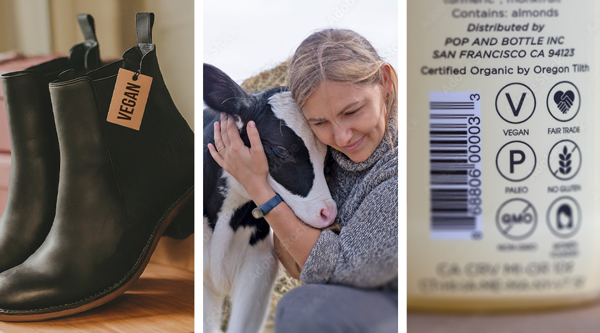The word “vegan” can refer to individuals or products.
Vegan Individuals
A vegan individual is someone who doesn’t eat animal products including meat, fish, eggs, or dairy.
Vegans generally don’t buy honey but vary in how diligently they check for honey in prepared foods. People who are vegan to prevent animal suffering usually don’t buy leather but they might wear leather they purchased before becoming vegan.
The most practical way to both be vegan and to make being vegan more inviting to others is to avoid apparent animal products without investigating minor ingredients in prepared foods. Because animal byproducts can be found in many industrial, commercial, and medical products, it’s practically impossible not to use some products that contain animal ingredients.

Vegan Products
A vegan product is a product that contains no animal ingredients.
While vegans normally strive to use products that cause as little harm to animals in their production as possible, we prefer to stick to a strict definition of a vegan product as one that simply contains no animal ingredients regardless of the production process.
For example, some sugar is produced using the bone char of animals, but we still consider that sugar to be technically vegan as there is no bone char in the final product. More info: Is Sugar Really Processed With Bones?
Another example is that some tropical oils are produced by destroying the habitat of orangutans and other animals. While we oppose this habitat destruction, and many vegans boycott tropical oils, the tropical oils produced from that land are technically vegan because they don’t contain animal ingredients. More info: Is palm oil vegan? Why the ingredient is, but the ethics behind it might not be.